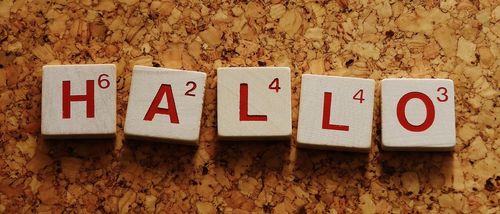How to say No in Chinese. 15 ways to say No in Mandarin Chinese
In this article, we will explore 15 different ways to say 'no' in Chinese, ranging from straightforward rejections to more nuanced expressions

How to say No in Chinese. 15 ways to say No in Mandarin Chinese
Saying 'no' can be a challenge in any language, but it's especially important in Mandarin Chinese where the culture places a high value on politeness and avoiding conflict. In this article, we will explore 15 different ways to say 'no' in Chinese, ranging from straightforward rejections to more nuanced expressions. Whether you're a language learner, a traveler, or simply seeking to expand your vocabulary, this guide will give you the tools you need to communicate your boundaries effectively in Mandarin. From basic phrases to idiomatic expressions, learn how to decline invitations, reject requests, and say 'no' with confidence in any situation.
In Mandarin Chinese, the word for no is 不 (bù). It can be used in a variety of situations to indicate that the answer to a question or request is negative.
For example:
• Q: 你要喝茶吗?(nǐ yào hē chá ma?) - Do you want to drink tea?
• A: 不要 (bù yào) - No, I don't want to.
It is also common to use 不 in conjunction with other words or phrases to indicate a negative response in a more polite or indirect manner. For example:
• Q: 你明天去不去?(nǐ míng tiān qù bù qù?) - Are you going tomorrow?
• A: 不去 (bù qù) - No, I'm not going.
In Mandarin Chinese, 不 is often used on its own to express negation in informal conversation. Sometimes, it's considered impolite to simply say 不 without any explanation or additional words. In more formal or polite situations, it's more appropriate to use more indirect or polite ways of indicating a negative response.
1. 不 (bù)
2. 不是 (bù shì)
3. 没有 (méi yǒu)
4. 不要 (bù yào)
5. 不可以 (bù kě yǐ)
6. 不对 (bù duì)
7. 不行 (bù xíng)
8. 不了 (bù le)
9. 没办法 (méi bàn fǎ)
10. 不是这样 (bù shì zhè yàng)
11. 不可能 (bù kě néng)
12. 不太可能 (bù tài kě néng)
13. 不会 (bù huì)
14. 没有办法 (méi yǒu bàn fǎ)
15. 不可以再 (bù kě yǐ zài)
In Mandarin Chinese, the word 不 (bù) is a common and widely used word for expressing negation. It is a simple and straightforward way to say no or not, and is used in a variety of contexts and situations. In informal conversation, 不 is often used on its own to express negation. Tt is common to only use 不 (bù) as the answer to express no in Mandarin Chinese. This is especially the case in casual conversations, where the use of a single word response like 不 is acceptable and easily understood
For example, if someone asks 你要喝茶吗? (nǐ yào hē chá ma?), which means Do you want to drink tea?, a response of 不 (bù) would indicate that the answer is no.
The phrase 不是 (bù shì) is often used to express negation or disagreement. The word 不 (bù) means no or not, and the word 是 (shì) is a verb meaning to be. When combined, 不是 means not to be, not is or is not.
Here are some examples of how 不是 can be used in Mandarin Chinese:
- 不是我 (bù shì wǒ) - It's not me.
- 这不是他的书 (zhè bù shì tā de shū) - This is not his book.
- 他不是医生 (tā bù shì yī shēng) - He is not a doctor.
- 不是吗 (bù shì ma) - Is that not so? or Isn't it?
- 这不是你说的吗 (zhè bù shì nǐ shuō de ma) - This is not what you said, right?
In these examples, 不是 is used to express negation and to indicate that something is not the case. The phrase can be used to reject a statement or to indicate that something is different from what was expected or assumed. The tone and emphasis can vary depending on the context and situation, but 不是 is generally a straightforward way of expressing negation in Mandarin Chinese.
3. 没有 (méi yǒu)
The phrase 没有 (méi yǒu) is a commonly used phrase in Mandarin Chinese that means not have or don't have. It is used to express the absence of something and is often placed before a noun to indicate that something does not exist or is not present.
Here are some examples of how 没有 can be used in Mandarin Chinese:
- 没有钱 (méi yǒu qián) - Don't have money.
- 没有计划 (méi yǒu jì huà) - Don't have a plan.
- 没有时间 (méi yǒu shí jiān) - Don't have time.
- 没有人 (méi yǒu rén) - No one. or Nobody.
- 这里没有你要的东西 (zhè lǐ méi yǒu nǐ yào de dōng xī) - The thing you want is not here.
In these examples, 没有 is used to express the absence of something. The phrase is a simple and straightforward way to say don't have in Mandarin Chinese, and is widely used in everyday conversation. The tone and emphasis of the phrase can vary depending on the context and situation, but it remains an important and versatile phrase for expressing the absence of something in Mandarin Chinese.
4. 不要 (bù yào)
不要 (bù yào) is a commonly used phrase in Mandarin Chinese that means don't or not want. It is used to express the speaker's preference or request that something not be done.
For example, if someone offers you a cigarette, you can reply 不要 (bù yào), meaning I don't want it. Or if someone asks to borrow your pen, you can reply 不要 (bù yào), meaning I don't want to lend it to you.
In general, 不要 is a common and useful phrase in Mandarin Chinese for expressing the speaker's wishes or desires, and can be used in a variety of situations where the speaker wants to indicate that they do not want to do something or do not want something to happen. The level of formality may vary depending on the context and situation, but 不要 is generally considered an informal expression.
Example: A: 你要喝啤酒吗? (nǐ yào hē pí jiǔ ma?) Do you want to drink beer?
B: 不要。(bù yào) No, I don't want to.
不可以 (bù kě yǐ) is a phrase in Mandarin Chinese that means cannot or not allowed. It is used to express the speaker's inability to do something or to indicate that something is not permitted.
For example, if someone asks to use your phone, you can reply 不可以 (bù kě yǐ), meaning I cannot let you use it. Or if someone tries to enter a restricted area, they might be told 不可以 (bù kě yǐ), meaning You are not allowed to enter here.
In general, 不可以 is a useful phrase in Mandarin Chinese for expressing the speaker's inability to do something or for indicating that something is not permitted. The level of formality may vary depending on the context and situation, but 不可以 is generally considered a relatively formal expression.
Here is an example conversation in Mandarin Chinese that uses the phrase 不可以:
A: 你可以借我你的投影仪吗? (nǐ kě yǐ jiè wǒ nǐ de tóu yǐng yí ma?)
Can you lend me your projector?
B: 不可以。 (bù kě yǐ)
No, I cannot.
6. 不对 (bù duì)
不对 (bù duì) is a phrase in Mandarin Chinese that means not right or incorrect. It is commonly used to express disagreement or to indicate that something is not accurate or correct.
For example, if someone makes a statement that you believe is incorrect, you can reply 不对 (bù duì), meaning that's not right. Or if someone asks for your opinion on a certain topic and you disagree, you could say 不对 (bù duì), meaning I don't agree.
In general, 不对 is a useful phrase in Mandarin Chinese for expressing disagreement or for indicating that something is not correct. The level of formality may vary depending on the context and situation, but 不对 is generally considered a relatively informal expression.
Here is an example conversation in Mandarin Chinese that uses the phrase 不对:
A: 我认为明天天气会很好。 (wǒ rèn wéi míng tiān tiān qì huì hěn hǎo)
I think the weather will be very good tomorrow.
B: 不对,明天会下雨。 (bù duì, míng tiān huì xià yǔ)
No, that's not right, it will rain tomorrow.
7. 不行 (bù xíng)
不行 (bù xíng) is a phrase in Mandarin Chinese that means not okay or can't do it. It is commonly used to express disapproval or to indicate that something is not allowed or not possible.
For example, if someone suggests doing something that you don't approve of, you can reply 不行 (bù xíng), meaning that's not okay. Or if someone requests something that you are unable to provide, you could say 不行 (bù xíng), meaning I can't do that.
In general, 不行 is a useful phrase in Mandarin Chinese for expressing disapproval or for indicating that something is not possible or allowed. The level of formality may vary depending on the context and situation, but 不行 is generally considered a relatively informal expression.
Here is an example conversation in Mandarin Chinese that uses the phrase 不行:
A: 今晚我们去吃夜宵吧。 (jīn wǎn wǒ men qù chī yè xiāo ba)
Let's go eat late-night snacks tonight.
B: 不行,我要早点休息。 (bù xíng, wǒ yào zǎo diǎn xiū xí)
No, that's not possible, I need to rest early
8. 不了 (bù le)
不了 (bù le) is a phrase in Mandarin Chinese that can mean no longer or not anymore. It is commonly used to express a change of situation, or to indicate that something is no longer possible or relevant.
For example, if someone asks you if you still want to do something, and you have changed your mind, you can reply 不了 (bù le), meaning no longer. Or if someone offers you something, and you have already declined, you could say 不了 (bù le), meaning not anymore.
In general, 不了 is a useful phrase in Mandarin Chinese for expressing a change of situation or for indicating that something is no longer possible or relevant. The level of formality may vary depending on the context and situation, but 不了 is generally considered a relatively informal expression.
Here is an example conversation in Mandarin Chinese that uses the phrase 不了:
A: 你还想喝点儿水吗? (nǐ hái xiǎng hē diǎn er shuǐ ma?)
Do you still want to drink some water?
B: 不了,谢谢。 (bù le, xiè xie)
No, thanks.
没办法 (méi bàn fǎ) is a phrase in Mandarin Chinese that can be translated as there's no way to do it, there's no solution, or there's nothing that can be done. It is often used to express frustration or helplessness in the face of a difficult or impossible situation.
For example, if someone is facing a problem that they cannot solve, they might say 没办法 (méi bàn fǎ), meaning there's no way to do it. Or if someone asks for help with a task that cannot be done, someone might reply 没办法 (méi bàn fǎ), meaning there's nothing that can be done.
In general, 没办法 is a common expression in Mandarin Chinese that conveys a sense of helplessness or frustration in the face of a difficult or impossible situation. The level of formality may vary depending on the context and situation, but 没办法 is generally considered a relatively informal expression.
Here is an example conversation in Mandarin Chinese that uses the phrase 没办法:
A: 这个问题怎么解决? (zhè gè wèn tí zěn me jiě jué?)
How do we solve this problem?
B: 没办法,太难了。 (méi bàn fǎ, tài nán le)
There's no way, it's too difficult.
不是这样 (bù shì zhè yàng) is a phrase in Mandarin Chinese that can be translated as not like this, not this way, or not correct. It is often used to correct someone's understanding or statement that is wrong or inaccurate.
For example, if someone makes a false statement or assumption, someone else might reply 不是这样 (bù shì zhè yàng) meaning not like this or not correct. Or if someone misunderstands a situation, someone might say 不是这样 (bù shì zhè yàng), meaning not this way.
In general, 不是这样 is a common expression in Mandarin Chinese that is used to correct someone's understanding or statement that is wrong or inaccurate. The level of formality may vary depending on the context and situation, but 不是这样 is generally considered a relatively informal expression.
Here is an example conversation in Mandarin Chinese that uses the phrase 不是这样:
A: 我认为这个问题很简单,可以在一天之内解决。 (wǒ rèn wéi zhè gè wèn tí hěn jiǎn dān, kě yǐ zài yī tiān zhī nèi jiě jué)
I think this problem is very simple and can be solved within a day.
B: 不是这样,这个问题比你想象的要复杂得多。 (bù shì zhè yàng, zhè gè wèn tí bǐ nǐ xiǎng xiàng de yào fù zá de duō)
Not like this, this problem is much more complicated than you think.
11. 不可能 (bù kě néng)
不可能 (bù kě néng) is a Mandarin Chinese word that is used to express that something is not possible or not likely to happen. It is commonly used to express disbelief, rejection, or negation. Here are some examples to help you understand how it is used in context:
Examples:
他说他能一个人抬起那个沙发?不可能!
Translation: He says he can lift that sofa by himself? Impossible!
她能在一周内完成所有的作业?不可能。
Translation: Can she complete all the homework within a week? Impossible.
他想要在一天内跑完全程马拉松?不可能,那太难了。
Translation: He wants to run a full marathon within one day? Impossible, that's too difficult.
In these examples, 不可能 is used to express that the speaker thinks the actions or events described in the sentences are impossible or unlikely to happen.
不太可能 (bú tài kě néng) is a Chinese expression meaning not very likely or unlikely in English. Here are a few more examples of its usage in sentences:
他们明年会结婚?不太可能。
Will they get married next year? Not very likely.
下雨天出去旅游?不太可能。
Going on a trip on a rainy day? Not very likely.
我们明天能够完成任务?不太可能。
Can we complete the task tomorrow? Not very likely.
不会 (bú huì) is a Chinese expression meaning won't or can't in English. Here are a few examples of its usage in sentences:
他不会唱歌。
Tā bú huì chàng gē.
He won't sing.
我不会玩电脑游戏。
Wǒ bú huì wán diàn nǎo yóu xì.
I can't play computer games.
你不会开车吗?
Nǐ bú huì kāi chē ma?
Won't you drive?
我们不会晚到。
Wǒ men bú huì wǎn dào.
We won't be late.
没有办法 (méi yǒu bàn fǎ) is a Chinese expression meaning there's no way or there's no solution. It is often used to express a sense of frustration or helplessness when faced with a difficult problem or situation that cannot be resolved. Here are a few examples of its usage in sentences:
这个问题没有办法解决。
Zhè ge wèn tí méi yǒu bàn fǎ jiě jué.
There's no way to solve this problem.
他们的婚姻问题没有办法了。
Tā men de hūn yīn wèn tí méi yǒu bàn fǎ le.
There's no way to resolve their marital problems.
对于这个难题,我们真的没有办法。
Duì yú zhè ge nán tí, wǒ men zhēn de méi yǒu bàn fǎ.
We really don't have any way to solve this difficult problem.
不可以再 (bù kě yǐ zài) is a Chinese expression that means can't be done anymore or no more. It is often used to express a sense of finality or to indicate that a certain action or behavior is no longer acceptable.
Here are a few examples of its usage in sentences:
不可以再犯同样的错误。
Bù kě yǐ zài fàn tóng yàng de cuò wù.
Can't make the same mistake again.
他不可以再做这样的事情。
Tā bù kě yǐ zài zuò zhè yàng de shì qíng.
He can't do this kind of thing anymore.
这种行为不可以再继续。
Zhè zhǒng xíng wéi bù kě yǐ zài jì xù.
This behavior can't continue anymore.








